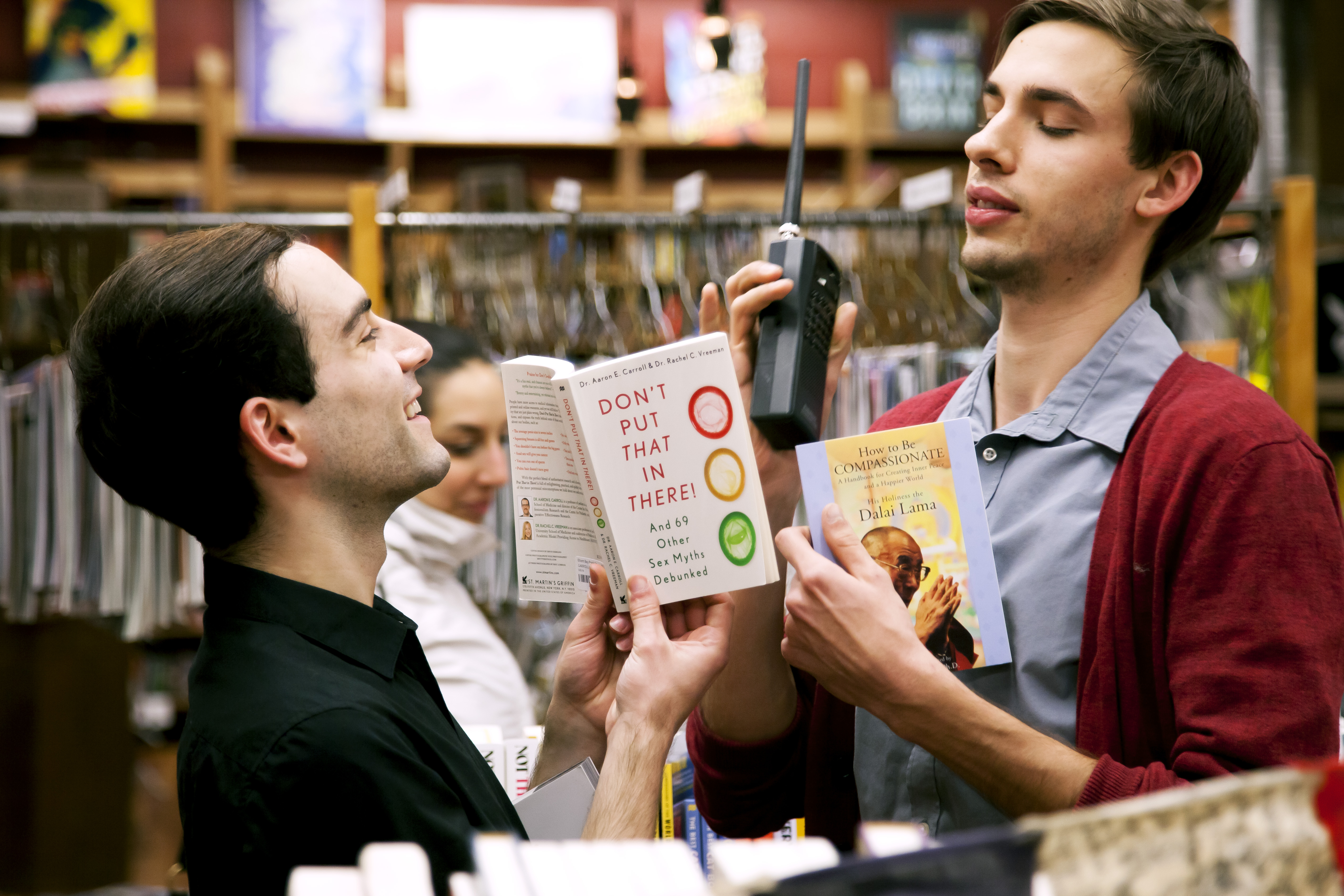Opening Nights
Natural
Annex Theatre, 1100 E. Pike St., 728-0933, annextheatre.org. $5–$10. 8 p.m. Tues.–Wed. Ends Feb. 18.
Winsome, full of flair, but but not terribly edgy, Marcus Gorman’s comedy Natural reminds me of Singles, the 1992 ensemble movie that partly inspired my future move to Seattle. In that Cameron Crowe flick, you may recall, a half-dozen Gen-Xers were searching for love and stumbling toward adulthood. Here, essentially, a half-dozen millennials do the same thing.
Professionally closeted Art (Shane Regan) and his live-in milksop boyfriend Theo (Sam Turner) share a snug though sexless life until brazen bartender Samantha (Allie Pratt) comes along, causing confusion about sexual orientation between the pair. Another disruptive force is Chloe (Pilar O’Connell), Theo’s disgruntled customer-service co-worker, an erotica blogger who arouses attention every time she enters the stage.
Dating and career woes drive the plot, though it oddly lags behind the times. First, while the rules of dating get updated as quickly as your OS, we hear no mention of social media or sexting. When Jeremy (Jaryl Draper), the poor man’s Barney Stinson, wants an escort, he uses the phone. Seriously? There’s an app for that. Natural sometimes feels like it was written by someone who hasn’t dated since MySpace. Second, three of Gorman’s characters work for a chain bookstore with a coffee shop; and as a former cafe manager of a major retailer, I know that such a workplace should offer a hotbed for comedic rants. Yet instead of exploring retail hell, Natural languishes in big-box limbo at best.
I don’t buy the notion that Art, in modern liberal Seattle, would have to hide his sexuality at work, another reason that Natural seems both topical and dated. But, like Singles, this comedy is eager to please. Gorman writes some adroit dialogue, as in a riveting scene when Chloe scorns the ex-stripper Samantha. Director Jen Moon keeps the action moving expeditiously in this properly minimal production. And Harry Jamieson’s subtle sound design suitably underscores each scene, bringing background sonorousness from stores to sports bars.
The marketing for Natural implies rather more Seattle specificity than it delivers. But at least there aren’t any Bertha jokes. Alyssa Dyksterhouse
Our Town
12th Avenue Arts, 1620 12th Ave., 800-838-3006, strawshop.org. $18–$36. 7:30 p.m. Thurs.–Sat., 2 p.m. Sun. Ends Feb. 21.
On the surface, Thornton Wilder’s Our Town is bland and dreary. When it debuted in 1938, Variety called it an “extravagant waste of fine talent.” Despite this, it went on to Broadway, garnered Wilder his second of three Pulitzers, and became one of the most-performed works in theater history. (Some avoid it for just that reason; I happened to be an Our Town virgin.)
Our Town is quintessential meta-theater. Wilder’s stage directions are simple: “No curtain. No scenery.” When we enter the show, we walk onto the stage. The play’s stage manager (Amy Thone) matter-of-factly tells us where we are and who we see; she informs us this is a play. She takes us back in time to 1901, to the provincial town of Grover’s Corners, New Hampshire, where things are slowly changing (and America, by implication, along with it).
We’re introduced to the locals: Dr. Gibbs and his wife (Rob Burgess and Marianne Owen), Mr. Webb and his wife (Greg Lyle-Newton and Sheila Daniels), their children, and their neighbors. We hear histories and gossip. We are witness to blossoming love between sporty young George Gibbs (Joe Cummings) and the bookish but beautiful Emily Webb (Anastasia Higham). And finally we see the inevitable loss.
Our Town has a clear arc that symbolizes in microcosm the life cycle of a community: daily life, love and marriage, and finally death. What is doesn’t have, however, is much dramatic action. Protagonists, antagonists, plot points, and denouement are muddled together. What’s left is mainly milieu. Our Town was Wilder’s reaction to the theater around him. He felt this “theater was not only inadequate, it was evasive.” Yet today the result is theater that’s almost invasive—a condescending reminder of things we already know, a guiding hand that makes decisions for us and tells us how to think.
As a result, though well cast and directed (by Greg Carter), this Strawberry Theatre Workshop production makes a better case for the company than for the text itself. Efforts have been made to connect Our Town with our town—including local celebs taking the role of Professor Willard, who describes the anthropological history of Grover’s Corners. The stage also nods to our present flush times: a construction set replete with Spackle, ladders, sawhorses, etc. But Seattle is booming while Grover’s Corners, at the fin de siecle, was fading. By 1938, amid the fatalism of the Great Depression, Wilder and his audience knew that. The old America was gone. In 2015, the poignancy of Our Town does still resound. For this critic, however, the only thing that made it novel was watching it for the first time. Irfan Shariff
E
stage@seattleweekly.com




